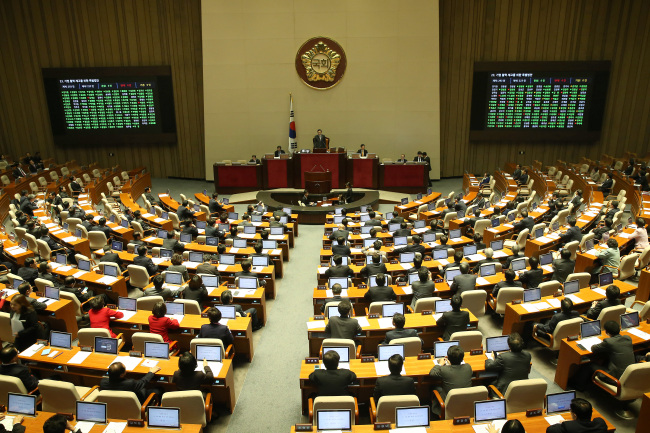The National Assembly on Thursday passed the much-delayed corporate revitalization bill to allow easier restructuring processes for financially pressed companies.
Other contentious bills related to the redistribution of electoral districts and labor reforms have been pushed back to an extraordinary session later this month.
In a plenary session delayed by half an hour due to last-minute hesitation from the main opposition party, the corresponding bill passed with 174 votes in consent, 24 in dissent and 25 in abstention.
 |
| The National Assembly holds a vote on the corporate revitalization bill on Thursday afternoon. (Yonhap) |
The ruling Saenuri Party and The Minjoo Party of Korea had agreed late last month to put the corporate bill, dubbed the “one-shot bill,” to a full plenary vote on Jan. 29.
The process was canceled at the last minute as the Minjoo Party insisted the revision bill of the Public Official Election Act to redraw the nation’s electoral map be processed en bloc, if not first.
“We have decided to wrap up the electoral map issue and process the pending bills in a rational order, even at the risk of delaying the general meeting,” said floor leader Rep. Lee Jong-kul.
Amid growing resentment for the sluggish legislation, however, the main opposition party decided to hasten the corporate bill.
“I demand that we all try (to pass the corporate bill) so as to prevent the public’s aversion to the parliament,” said Kim Jong-in, the Minjoo Party’s emergency committee chairman, prior to the plenary session.
Floor leader Lee also said that his party would cooperate in the vote, as long as the parliamentary speaker and the ruling party agreed to finalize the electoral map by next Friday.
Speaker Chung Ui-hwa, while urging parties to vote on the much-deferred bill, underlined that each lawmaker should cast a vote based on his or her own belief, not according to the party’s instruction.
“Parties should refrain from setting a binding party platform, unless the issue is critical enough to decide the nation’s fate or the party’s maintenance,” Chung said.
The corporate revitalization bill, dubbed the “one-shot bill,” was motioned in July last year to encourage preemptive corporate restructuring by alleviating regulations for small-sum mergers and acquisitions processes.
It is to be applied, within the limitation of three years at maximum, to insolvent companies planning to reorganize themselves due to oversupply in the industry.
The opposition camp had claimed until recently that conglomerates should be excluded from such benefits, citing the possible abuse for the sake of management succession.
But it yielded the condition in a compromising gesture, demanding that the ruling party make equivalent concessions in other disputed bills, such as the North Korean human rights bill.
The passage of the corporate bill is expected to be especially beneficial to local steelmakers and shipbuilders that have been reeling under the sluggish global economy and rising competition from China.
By Bae Hyun-jung (tellme@heraldcorp.com)

